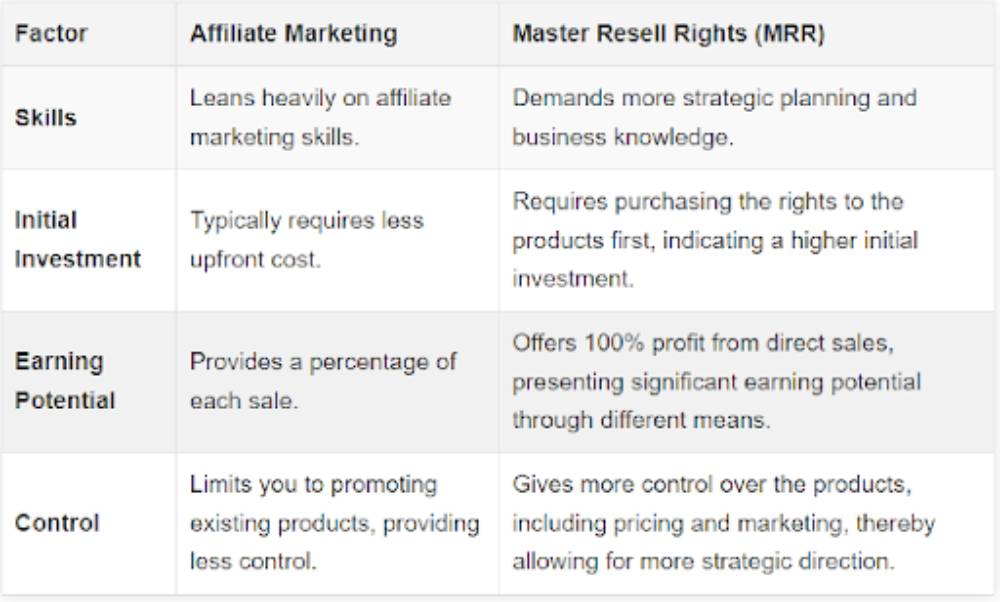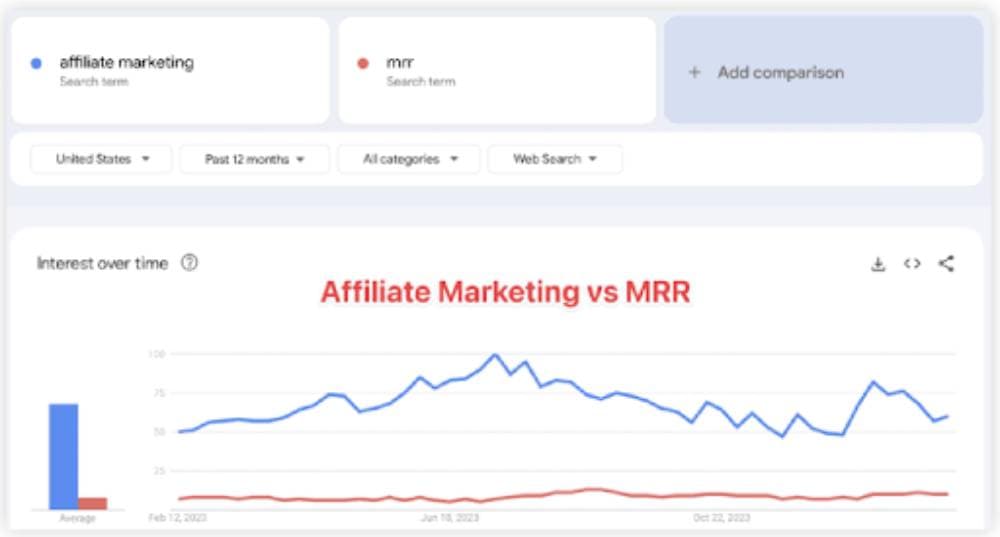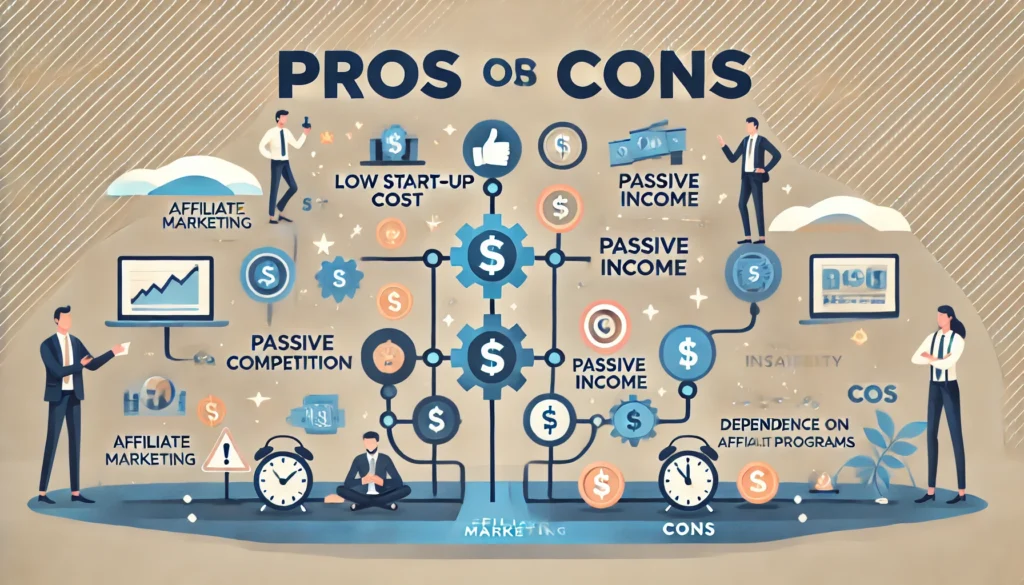There are ongoing discussions in the online business world regarding the distinctions between master resell rights and affiliate marketing.
When considering different methods of making money online, aspiring entrepreneurs may come across these two popular options.
This blog post will explore the details of master resell rights and affiliate marketing to assist you in making informed decisions for your business.
We will be investigating various types of digital product rights, exploring license agreements, and showcasing websites that offer MRR products.
Additionally,
This course covers strategies for promoting MRR products, building trust with buyers, and selecting private label content wisely.
In this discussion, we will clarify the differences between affiliate marketing and master resell rights in terms of earning potential and approach. Let’s explore the world of Master resell rights vs. affiliate marketing.

Which Is Better Affiliate Marketing or MRR?
I generate revenue through affiliate marketing and have recently begun selling MRR content, gaining valuable insights into successful strategies for both models.
Affiliate marketing is often recommended as a suitable option for beginners.
Affiliate marketing entails creating campaigns for niche products and earning commissions based on your marketing efforts.
Online business is a good option for beginners or those looking to start with minimal investment and potential for passive income.
It provides the opportunity to test various products and niches with reduced financial risk.
For individuals with strong sales skills and the resources to invest in high-quality products upfront, MRR may offer a quicker path to substantial earnings.
One can actually make money from both at the same time, without having to choose one over the other.
Which One Should You Pick to Make Money?

When deciding between affiliate marketing and master resell rights (MRR), consider your preferences, resources, and level of effort. Both options have unique advantages and drawbacks that should be weighed against your business objectives.
When considering a business model for generating online income, affiliate marketing is often considered a strong option.
The model’s selling point is its flexibility and opportunity for high earnings based on effective marketing strategies.
For some, it is a popular choice because of the minimal initial investment required and the significant potential for long-term passive income.
Master Resell Rights provide you with more control over the products you sell.
With MRR, you purchase the rights to a product and market it as your own, retaining all profits.
This model entails an initial investment and a strong strategy to differentiate itself in a competitive market. However, it provides a faster route to profitability for those prepared to address these challenges directly.
Here are some factors to consider when making your decision.

Success in either model is dependent on dedication, continuous learning, and adaptability.
Consider your skills, preferences, and financial goals when making your decision to ensure alignment with potential for growth.
The conclusion is...
Are Either of Them Pyramid Schemes?
It is important to distinguish between online business models such as affiliate marketing and Master Resale Rights (MRR) from pyramid schemes.
Recognizing this difference can help prevent legal complications and guarantee that your business practices are ethical and long-lasting.

A pyramid scheme is a business model that generates profit mainly through recruiting new distributors rather than selling actual products or services. Characteristics of a pyramid scheme include:
- The company’s revenue is primarily generated through recruitment rather than product sales.
- Compensation is based on enrolling others rather than product sales.
- Membership requires significant initial financial commitment.
- Promising exponential returns based on increasing the recruitment “downline.”
- Utilizing a system of exchanging money within a closed group of investors rather than generating revenue from external sales.
Affiliate marketing involves the promotion of products or services for a company in exchange for a commission on sales.
Income is generated solely from your marketing efforts, eliminating the need to recruit additional affiliates, making it a straightforward and legitimate method of earning money online.
In contrast to pyramid schemes, MRR involves purchasing the rights to a product to sell as your own and retaining all profits from sales.
This business model involves selling a tangible product with an initial investment, focusing on product sales rather than recruitment. It promotes entrepreneurship by providing the opportunity to build a product portfolio without starting from zero.
THE BOTTOM LINE
Affiliate Marketing vs MRR: Which One is More Popular?
According to data analysis, search volume is frequently associated with general popularity.
Popularity may vary depending on economic trends, technological advancements, and changes in consumer behavior.
According to Google Trends data, affiliate marketing is the more popular of the two business models.
The chart below shows a comparison of the organic search popularity of affiliate marketing and MRR over the past year.

What is Affiliate Marketing?
Affiliate marketing is a well-known form of performance-based marketing in which a business compensates its affiliates for generating sales or leads through their marketing efforts.
The marketing strategy involves revenue sharing, with affiliates receiving a commission for each sale or lead they generate.
In affiliate marketing, both the business and the affiliate mutually benefit – the business acquires more customers, while the affiliate generates income.
How Does Affiliate Marketing Work?
In affiliate marketing, affiliates choose products or services to promote.
Affiliate commissions are earned when customers make purchases through your unique link.
The performance-based earning model is appealing as it offers the opportunity to earn income without the responsibility of product creation or inventory management.
The earning potential in affiliate marketing can vary significantly based on factors such as the chosen affiliate program, promoted products or services, commission structure, marketing strategies, and audience size and engagement.

Basics of Earning Commissions
The commission rate received is dependent on the program and product being offered.
Digital products frequently provide higher commission rates, usually ranging from 30% to potentially exceeding 50%.
Digital products such as software, eBooks, online courses, and memberships allow vendors to offer higher commissions due to the absence of physical manufacturing or shipping costs.
Commission rates for physical products typically range from 4% to 15%.
These costs stem from the production, storage, and shipping of physical items.
Understanding affiliate commissions involves more than just knowing the percentage earned from each sale.
It is important to understand the different commission structures in affiliate marketing, as they can have a significant impact on your earnings and approach.
- Pay-per-sale: A commission is earned based on the sale price when a purchase is made through your link.
- Pay-per-click (PPC): You receive a commission for every visitor you send to the merchant’s website, regardless of whether a purchase is made.
- Pay-per-lead (PPL): A commission is earned when referred visitors submit their contact information on the merchant’s site.
Key Players in the Industry
The three primary players in affiliate marketing are affiliates, merchants, and consumers.
- Merchants: Individuals or businesses, also known as creators or sellers, develop and offer products or services. They set up affiliate programs to encourage promotion by affiliates.
- Affiliates: Affiliates are individuals or companies who promote a merchant’s offerings through different channels such as blogs, social media, or email marketing to reach potential customers.
- Customers: The customers who buy the merchant’s products through affiliate referrals.
Affiliate networks facilitate connections between merchants and affiliates by providing a platform for managing their relationship.
With 81% of brands offering affiliate programs, there is a wide variety of products and services available for promotion.

Pros of Affiliate Marketing
It is possible to earn money while sleeping, traveling, or spending time with loved ones.
Affiliate marketing provides opportunities for generating passive income, attracting many individuals due to its allure.
Participating in affiliate marketing has various benefits.
Low Startup Costs: The primary focus is on promoting existing products, eliminating the need for product development and inventory management, thus reducing costs.
Passive Income Potential: After your promotional content is published and traffic increases, you have the potential to earn commissions consistently, even during inactive periods.
Flexibility: Affiliate marketing provides the flexibility to work remotely and create your own schedule, enabling you to select products that align with your audience and personal preferences.
Cons of Affiliate Marketing
While affiliate marketing can be attractive, it does come with its fair share of challenges.
- Competition: Affiliate marketing is a highly competitive field, requiring creativity and strategic planning to stand out in a saturated market.
- Dependence on Merchants: Fluctuations in commission rates or product discontinuations may impact your earnings.
- Limited Control: Affiliates must follow the guidelines set by the merchant and have limited control over the product, pricing, and marketing strategies.
What is MRR (Master Resell Rights)?
Master Resale Rights (MRR) are a growing method for online income generation.
MRR is applicable to all digital goods, including eBooks, software, and video courses, that can be rebranded and marketed as your own.
How Does MRR Work?
The Concept of Selling Rights
Master Resell Rights is a license that grants the purchaser the ability to resell a product and also pass on the rights for customers to sell it.
When you purchase a product with MRR, you are able to sell it multiple times and retain all of the profits.
MRR differs from traditional retail or digital sales by adding an extra layer to the transaction process.
This feature enables customers to also act as sellers, potentially converting your product into an additional source of income for them.
This provides a notable benefit compared to other methods of online selling that are restricted to profits solely from direct sales.
Potential for Profit
Master Resale Rights offer significant profit potential as you keep all sales revenue, unlike affiliate marketing where you earn a commission. This business model has the potential to be lucrative.
Here is a simple comparison:

Pros of MRR
Selecting MRR offers various advantages.
- Full Profit Control: In a model where you retain 100% of the sales revenue, your income potential is significantly higher compared to commission-based models.
- Flexibility in Marketing: You have the flexibility to determine pricing, bundle products, and utilize them as a strategic tool in marketing.
- Quick to Market: With MRR, products are pre-developed, allowing for immediate sales without the need to invest time and resources in creating something new.
Cons of MRR
However, there are some drawbacks to take into consideration.
- Initial Investment: Acquiring MRR licenses requires an upfront payment that may be difficult for newcomers.
- Market Saturation: The distribution of MRR products to various resellers can result in market saturation, necessitating the use of distinct marketing tactics to boost sales.
- Quality Control: It is important to assess the quality of a product before purchasing to ensure it meets your standards and expectations, especially when you are not the creator.
Differences Between Affiliate Marketing and MRR
When examining affiliate marketing and Master Resell Rights (MRR), it is essential to acknowledge significant distinctions.
These differences can have a significant impact on your decision-making process, particularly if you are looking to start a new online business.
Startup Costs
Affiliate marketing is often considered more appealing for startup costs due to its low entry barrier.
In general, promoting a product without upfront payment can be appealing for those with budget constraints.
On the other hand, MRR involves an initial investment for obtaining the resell rights, which can vary depending on the product’s value and demand.
Customer Relationship

Customer relationship management differs between the two business models.
With MRR, sellers are tasked with handling customer support and cultivating lasting relationships, serving as both an opportunity and a challenge depending on their customer service abilities and resources.
In affiliate marketing, the product owner takes care of all customer interactions, allowing you to avoid the details of customer service.
Revenue Share
The revenue share structure presents a notable distinction.
In affiliate marketing, earnings are calculated as a percentage of each sale, with the specific percentage varying depending on the program and product.
However, with Master Resell Rights (MRR), sellers retain 100% of the profits from their sales, which can result in higher earnings per product sold.
Control Over Pricing
One notable advantage of MRR over affiliate marketing is the ability to control pricing.
With MRR, businesses have the ability to set their own prices, allowing for flexibility in implementing different pricing strategies to appeal to a wider customer base.
In affiliate marketing, the product owner determines the price, and your ability to negotiate may be limited unless you have a large following or negotiating skills.
Risk Factors
The risk factors for each model must be carefully considered.
Affiliate marketing is a low-risk option with minimal upfront costs, but success hinges on generating successful referrals amid strong competition.
On the other hand, investing in MRR carries inherent risks due to the initial investment and the continuous need for effective product marketing.
However, the potential for increased earnings may warrant this risk for certain entrepreneurs.
Final Thoughts
Choosing between affiliate marketing and MRR is an important decision for new online business owners.
However, there is no need to make a decision.
Investing in both affiliate marketing and MRR can provide a balanced approach, combining the opportunity for commissions with the potential for increased profits from direct sales.
Success in online business depends not only on selecting the right model but also on the effectiveness of its execution.
Frequently Asked Questions
What are the key differences between master resell rights and affiliate marketing?
Master resell rights (MMR) allow individuals to sell products along with their resale rights, retaining all profits. On the other hand, affiliate marketing involves promoting products from others and earning a commission for each sale through a referral link. MRR is specifically geared towards selling digital products with resale rights, while affiliate marketing encompasses a wide range of products with no ownership or resale rights.
How can I use master resell rights to make money online?
To earn income with MRR, acquire digital products with master resell privileges, market them to customers, and retain all proceeds from sales. Additionally, you have the option to allow customers to resell these products. Implementing successful marketing strategies like email campaigns, social media ads, content development, and SEO can enhance sales.
What types of products are available with master resell rights?
Digital products with Master Resell Rights (MRR) include eBooks, software applications, video courses, audio files, website templates, and themes/plugins for content management systems. These items cover a wide range of topics and it is important to ensure they are high-quality before buying.
Are there any restrictions on how I can market a product with master resell rights?
When purchasing an MRR product, be sure to carefully review the specific license agreements provided by the original creator. These agreements outline any restrictions related to pricing policies or promotional methods allowed for that particular item. It is important to understand limitations that may include minimum price requirements or restrictions on certain advertising channels set by creators.
How do commissions work for affiliate marketing compared to those for master resell rights?
Affiliate marketing involves earning a commission based on the percentage of sales made through your referral link. Commission rates vary depending on the product and company policies. With MRR, you can keep 100% of profits from selling products with resale rights, but there are no commissions for subsequent sales made by customers who purchased resell rights from you.

